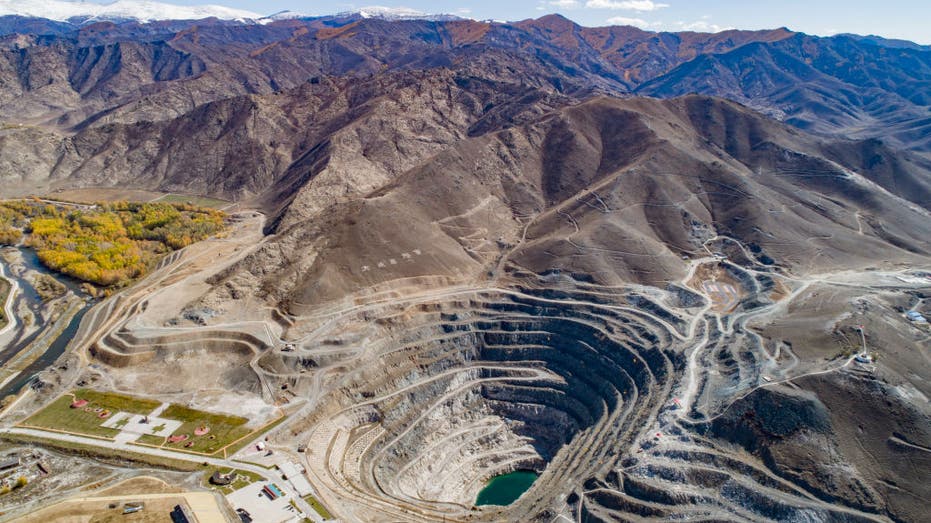China's bid to host a 'carbon-neutral' Olympics derided as a 'sleight-of-hand'
China recently announced a plan to utilize raw materials in hopes of bolstering its alternative energy use.
Beijing Olympics loom amid reports of Chinese slave labor
Correspondent Hillary Vaughn has the details from Capitol Hill on 'Cavuto: Coast to Coast.'
China is pursuing a "carbon-neutral" Olympics for February in what appears to be the latest attempt to signal interest in combating climate change alongside the international community.
According to IEEE, the nation also intends to power all of its 26 venues with renewables. State media also reportedly claims that more than 85% of public transport vehicles at the Olympics will be powered by alternative energy like hydrogen fuel cells.

Illuminated Olympics rings and Beijing 2022 emblem installations during the opening ceremony of an International Ice and Snow Carnival at Shenyang Olympic Sports Center Dec. 30, 2021, in Shenyang, Liaoning Province of China. (VCG/VCG via Getty Images (VCG/VCG / Getty Images)
But critics allege that China, which dominates other countries in emissions, is merely engaging in a "sleight-of-hand" as James Taylor, president of the Heartland Institute, put it.
US, GLOBAL CLIMATE GOALS WOULD BE BOON TO CHINA, INTERNATIONAL AGENCY INDICATES
"China claiming to produce a carbon-neutral Olympics merely highlights the sleight-of-hand of ‘zero-carbon claims,'" Taylor told FOX Business.

A cleaner works at Jinanqiao station of the western Line 11 Dec. 24, 2021, in Beijing, China. The west section of Line 11 is 4.2 kilometers long with four stations. (Jia Tianyong/China News Service via Getty Images) (Getty Images)
"Coal powers the majority of Chinese electricity every day of the year. Coal and oil will power the construction and setup of China’s Olympic facilities. Oil and gasoline will bring China’s construction workers to the Olympic facilities, China’s citizens to the venue and athletes and spectators from around the world. China produces more carbon dioxide emissions than the entire Western Hemisphere combined."
Steve Milloy, a former Trump advisor, agreed.
"China’s bid to put on a ‘green’ Olympics is farcical greenwashing," Milloy said. "China is currently producing and burning record amounts of coal."
The Chinese government has made several assurances that it will transition to alternative energies, something the nation seems uniquely poised to do given its vast resources of raw materials.

Aerial view of the "No. 3 pegmatite," the largest mining pit in the world, which has deposits of 84 types of minerals, at the Koktokay National Geopark on Sept. 27, 2020, in Fuyun County, Xinjiang Uygur Autonomous Region of China. (Shen Longquan/VCG (Getty Images)
The industrial giant has a long way to go, however, to reach its stated goal of net-zero emissions by 2060, 10 years after the U.S.'s target. Just days after China's goal was reaffirmed in a statement last year, the Chinese government reported that output from its coal mines had reached its highest level since 2015.
Nevertheless, it has repeatedly indicated an interest in radically altering energy consumption. More recently, the Chinese government announced a plan targeting its raw materials industry. According to S&P Global, the government said it would target sectors like nonferrous metals and petrochemicals with an eye toward reducing steel consumption.

LONDON, UNITED KINGDOM: A protester holds a placard during the No Beijing 2022 protest. (Thomas Krych/SOPA Images/LightRocket via Getty Images) (Getty Images)
GET FOX BUSINESS ON THE GO BY CLICKING HERE
Any move to renewables could be complicated, however, as China faces international pressure over its use of forced labor to produce materials like silicone. Based on the country's outsized share of key resources, economic sanctions could complicate the global move towards renewables as well.
Just last month, President Biden signed bipartisan legislation aimed at blocking imports from Xinjiang, where the regime has persecuted Uyghurs to the extent that the prior administration designated its activities as genocide. That issue has moved the U.S. into a diplomatic boycott of the 2022 Olympic games, with the U.K., Canada and Australia doing the same.




















